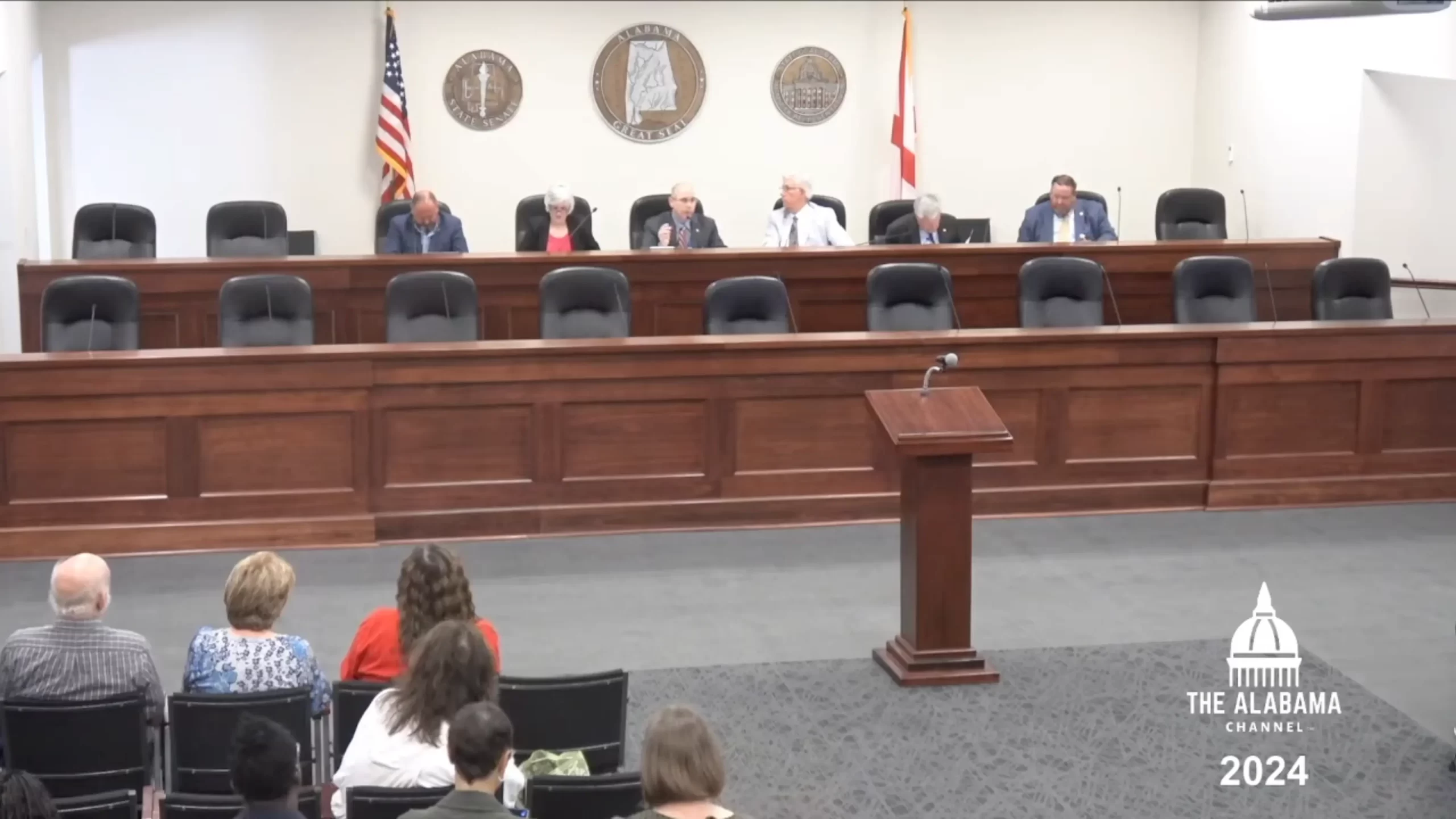Sen. Clyde Chambliss, R-Scottsboro, opened the Joint Prison Oversight Committee’s annual public hearing by telling the people waiting to speak that they should not expect too much.
“As a reminder, some folks think that we can just go tomorrow and make changes immediately,” he said. “That’s not the way our system is designed, that’s not the way it works.”
Trying to head off contentious comments, Chambliss then explained the separation of powers in Alabama’s state government and said the legislature does not “deal with the day-to-day affairs of running government.”
One member of the public, Tim Mathis, spoke about the death of his son Chase in Elmore Correctional Facility.
Suffering from a prescription pain pill addiction, Chase crashed his car in 2014, killing his friend and sending him to the hospital. In 2017, he was sentenced to fifteen years on a manslaughter charge.
Once in prison, Tim Mathis says his son could not enroll in a substance abuse program and was even initially denied the wheelchair he needed after the accident.
But his family, Mathis stated, still “had no idea at the time that took place it was going to turn into a death sentence at the hands of the ADOC.”
“I answered the phone,” he remembered. “[The warden] said ‘Mr. Mathis?’ I said ‘yes,’ she said ‘I have bad news for you, Chase is deceased.’ It was just that short, just that blunt.”
Chase had died of an overdose on June 4. His father believes it may have been murder but that the availability of drugs in Alabama prisons is a major problem regardless.
“Now Chase did have an addiction problem, but you can’t lock a drunk up in a liquor store and expect him to stay sober,” Mathis told the committee. He said he will begin paying for billboards in the Montgomery area criticizing the ADOC and Gov. Kay Ivey soon.
Several other Alabamians also advocated for criminal justice reform at the committee hearing.
Rosalyn Warren, a self-identified “believer in rehabilitation,” nevertheless admitted that “most of these people who are incarcerated, they’re not in there because they’re singing in a choir too loud.”
“But anybody who’s punished for a crime, the punishment is to be removed from society, not to be assaulted, not to be killed, and not to be treated inhumanely,” she continued.
“When my father went to prison, he was just a thug, just a really bad type of a person,” Warren said. “But because my dad went to prison early, and he was rehabilitated as far as education … me and all my siblings, we all have college degrees and no one has a criminal record.”
When talking to the committee, she specifically pointed to the criminal justice system in Norway as an exemplar.
In the ‘80s and ‘90s, the recidivism rate in Norway was around two-thirds. Then the country invested more into their prisons and began focusing on rehabilitation. Now only around 25 percent of former inmates reoffend within 5 years of release.
By way of comparison, the 3-year recidivism rate in Alabama is 29 percent. One 2021 study of 24 states, including Alabama, by the U.S. Department of Justice found the 10-year recidivism rate in America was 82 percent.
Matthew Charles, who was the first person released from prison under the First Step Act and one of President Donald Trump’s guests at the 2019 State of the Union, also spoke to the committee on behalf of Families Against Mandatory Minimums.
Charles highly praised SB322, which increased staffing and transparency at the ADOC. However, he said the bill “would not have prevented many of the deaths and horror stories we hear today” and called it “a step in a series of steps that are necessary, and not a resting point.”
Joseph Hyatt, whose nephew was killed in prison last year, said he understands that things take time but that the committee has been “overlooking what’s going on in the prisons.”
“We’ve got a hundred and fifty deaths so far,” Hyatt said. “Now some of them are murders, some of them are drug-related. Your prison system, I don’t see where y’all are doing anything different.”
“You’ve got to act quick,” he told the committee.
Other speakers called out the drug problem in Alabama’s prisons, said “super prisons” are not the answer, and tearily recounted their personal stories of family members dying while in state custody.
Former Alabama Governor Don Siegelman and state senator Vivian Figures, D-Mobile, both criticized the Alabama prison system and spoke about why significant reform is needed.
“I had not planned to speak this morning, but as I sat there and listened to the testimonies of these people, I couldn’t help but be pulled to this microphone,” Figures said.
“[Inmates] are in the care of the Department of Corrections of the state of Alabama,” she said. “And it is our responsibility to keep them safe, which is what the federal government have told us and mandated that we do. But we haven’t.”
Figures complained that hardly any members of the state legislature attended the committee meeting despite being invited. She then suggested that “legislators need to spend some time in these prisons for a couple, three days without any protection” in order to understand prisoners’ plight.
Chambliss rejoined that he had only invited the legislators a couple weeks earlier and many already had plans. State representative Chris England, D-Tuscaloosa, stated that they had the highest turnout of state legislators ever.
“Now is not the time to get discouraged, to get mad, and point fingers,” England said. “Now is the time to continue to organize. Build your army and continue fighting.”



















































